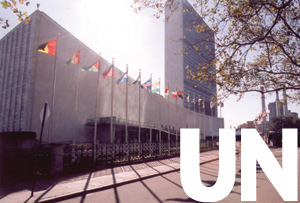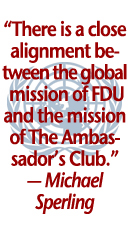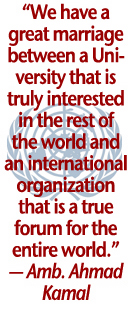

Renewing Old Bonds
On Tuesday, June 26, 1945, on the stage of the San Francisco Opera House, delegates from 50 countries signed the Charter of the United Nations, officially giving birth to perhaps the most ambitious attempt at global cooperation in the world’s history. The peoples of the United Nations pledged, among other goals, “to save succeeding generations from the scourge of war,” “to reaffirm faith in fundamental human rights” and “to promote social progress and better standards of life in larger freedom.” Today, the world body includes 191 countries, just about every nation on the face of the Earth.
Peter Sammartino, founding president of FDU, realized that having the U.N. headquarters in Manhattan represented an exciting opportunity for his students to better understand their world. Through his leadership and influence, students and faculty frequently visited the United Nations. Ambassadors regularly came to the University to lecture or teach. Students personally escorted and drove U.N. dignitaries to campus.
The U.N. connection was strengthened by individuals like Nasrollah Fatemi, a U.N. diplomat from Iran who began teaching at FDU in 1955 and founded the University’s Institute of Graduate International Studies. (His son, Faramarz Fatemi, now directs FDU’s School of History, Political and International Studies on the Metropolitan Campus.)

Soon after arriving as the sixth president of Fairleigh Dickinson University in 1999,
J. Michael Adams decided to renew the global themes that Sammartino had emphasized. He articulated a global vision designed to educate global citizens. “We saw the United Nations as a major building block,” he recalls. “The history of our affiliation was certainly a factor. And, as a world citizen, you naturally would embrace an organization that comes together as a collective to solve world problems.”Adams and Michael Sperling, associate provost for interdisciplinary, distributed and global learning, established a relationship with Ahmad Kamal, senior fellow at UNITAR (U.N. Institute for Training and Research), president of The Ambassador’s Club at the United Nations and former ambassador of Pakistan to the United Nations. “There was goodwill from the beginning,” Sperling says. “There is a close alignment between the global mission of FDU and the mission of The Ambassador’s Club, which is dedicated to bringing educational programs to a select group of universities.”
“We have a great marriage between a University that is truly interested in the rest of the world and an international organization that is a true forum for the entire world,” says Kamal.
Kamal agreed to help arrange a few lectures initially and helped the University apply for and earn accreditation as a nongovernmental organization (NGO) associated with the Department of Public Information of the United Nations.

“He’s been absolutely central to what we’ve been able to build here,” Sperling says. “He’s played many roles, collaborating with us to produce videoconferences and select speakers. He’s been a respected diplomat for many years, and is very well known and admired within the United Nations.”
Kamal says that with globalization it has become very important to learn about events happening elsewhere; however, he adds, in the United States there has been “a lesser tendency to interest itself in other cultures and other languages.” Because the United States is the sole surviving superpower, he says, “It becomes absolutely vital to build the knowledge inside the United States about the rest of the world. That is the raison d’etre of global education.”
He adds, “Fairleigh Dickinson has a vision of putting itself in the world rather than just in the United States. At the United Nations, we are at the center of what can only be described as the most universal organization in the world. And therefore it is the natural forum for anything connected with global problems and global understanding. Its sphere of activities covers everything from economics to politics to human’s rights and the environment.”
The Office of Interdisciplinary, Distributed and Global Learning at Fairleigh Dickinson University manages the University’s U.N. programs, which are led by Dalila Suhonjic, the director of global initiatives. “The University community has welcomed the U.N. programs we are providing,” she says. “Faculty and students are not only taking advantage of what’s available, but also helping us to further develop and enhance these offerings. At the United Nations, I meet more and more officials who are familiar with our University and our mission, and who want to join the partnership and add their contribution to our programs.”
Return to Opening Page
Renewing Old Bonds | An Illustrious Lineup
Curricular Connections | In the Front Lines
Students Seize the Initiative | A Long Line of Links
FDU Magazine Home | Table of Contents | FDU Home | Alumni Home | Comments
©Copyright 2004 Fairleigh Dickinson University. All rights reserved.
For a print copy of FDU Magazine, featuring this and other stories, contact Rebecca Maxon, editor,
at 201-692-7024 or maxon@fdu.edu.